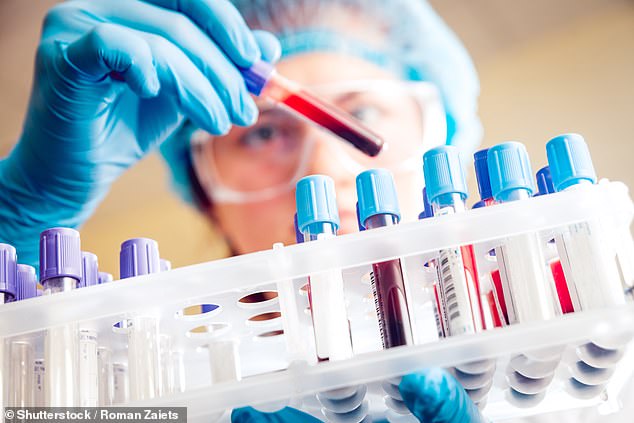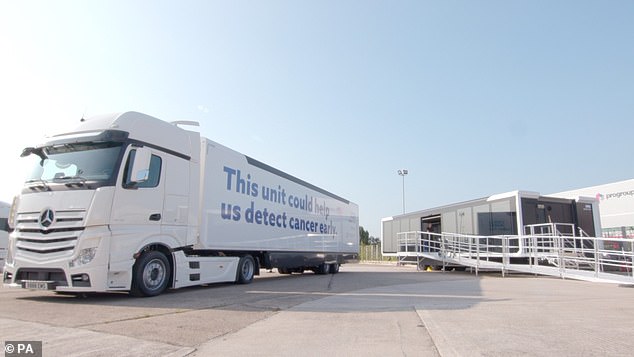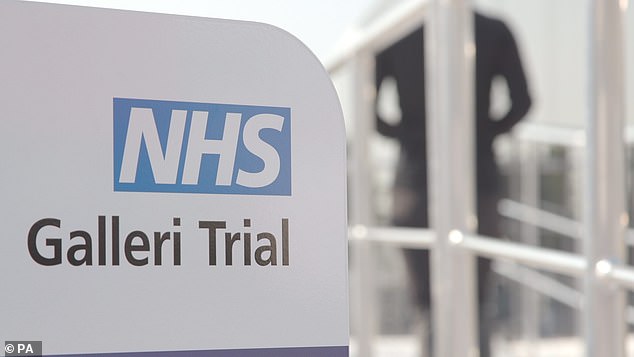A ‘holy grail’ blood test which can diagnose 50 types of cancer before symptoms appear begins trials with 140,000 Britons today.
The Galleri test, currently available in the US, can detect cancers that aren’t routinely screened for and can accurately pinpoint where in the body the disease is coming from.
Catching cancer early is vital to people receiving prompt treatment and the test has the potential to save thousands of lives in the UK every year.
It works by looking for chemical changes in fragments of genetic code – cell-free DNA (cfDNA) – that leak from tumours into the bloodstream.
Some cancer tumours are known to shed DNA into the blood a long time before a person would start experiencing symptoms.
The Galleri test does not detect all cancers and does not replace NHS screening programmes, such as those for breast, cervical and bowel cancer.
Around 360,000 people are diagnosed with cancer in the UK every year, which is the equivalent of 1,000 cases being spotted every day.

The Galleri test, which is currently available in the US, can detect cancers that are not routinely screened for and can pinpoint where in the body the disease is coming from with a high degree of accuracy
How does the Galleri cancer test work?
The Galleri cancer test works by screening the blood for abnormalities that could indicate cancer.
Its developers say the test can detect over 50 types of cancer, and pinpoint where they are in the body.
Those taking part in the trials will be asked to give three samples of blood over the course of three years- each being around one and a half tablespoons (about 20 mL) of blood, just like a normal blood test.
These are sent to a laboratory where scientists screen the sample for DNA with abnormal chemical changes.
It works by looking for chemical changes in fragments of genetic code – cell-free DNA (cfDNA) – that leak from tumours into the bloodstream.
Some cancer tumours are known to shed DNA into the blood a long time before a person would start experiencing symptoms.
Galleri says it takes around 10 days to turn around a test.
They add that their test should be used in conjunction with normal screening programmes.
Scientists found in clinical trials that the test detected cancer correctly in 51.5 per cent of cases.
The trial involved 2,823 people who had cancer, and 1,254 people who did not.
Source: Galleri
Advertisement
In the US, it has been recommended for people at higher risk of cancer, including the over-50s.
As part of the NHS trial, which is the world’s largest, blood samples will be taken from today at several mobile testing clinics in retail parks and other community locations.
The NHS aims to recruit 140,000 volunteers in eight areas of England to see how well the test works in the health service.
Letters are being sent to people from different backgrounds and ethnicities aged between 50 and 77 asking them to take part.
Participants, who must not have had a cancer diagnosis in the last three years, will be asked to give a blood sample at a local mobile clinic and they will then be invited back after 12 months, and again at two years, to give further samples.
NHS chief executive Amanda Pritchard said: ‘This quick and simple blood test could mark the beginning of a revolution in cancer detection and treatment here and around the world.
‘By finding cancer before signs and symptoms even appear, we have the best chance of treating it and we can give people the best possible chance of survival.
‘The NHS has a successful track record of leading the way on innovations in cancer diagnosis and treatment, from CAR-T therapy to Covid-friendly drugs.
‘The Galleri blood test, if successful, could play a major part in achieving our NHS Long Term Plan ambition to catch three-quarters of cancers at an early stage, when they are easier to treat.
‘So if you are invited, please take part – you could be helping us to revolutionise cancer care and protect yourself.’
The test has been found to be particularly effective at finding cancers that can be difficult to identify early – such as head and neck, bowel, lung, pancreatic, and throat cancers.
The NHS trial is being led by the Cancer Research UK and King’s College London Cancer Prevention Trials Unit together with Grail, which developed the Galleri test.
Eight NHS Cancer Alliances are supporting the plan, with people invited to take part from Cheshire and Merseyside, Greater Manchester, the North East, West Midlands, East Midlands, East of England, Kent and Medway, and South East London.

The test works by looking for chemical changes in fragments of genetic code – cell-free DNA (cfDNA) – that leak from tumours into the bloodstream
The first results from the study are expected by 2023. If successful, the NHS in England plans to extend the rollout to a further one million people in 2024 and 2025.
In the trial, half the people will have their blood sample screened with the Galleri test straight away and the other half will have their sample stored and may be tested in the future.
This will allow scientists to compare the stage at which cancer is detected between the two groups.
Anyone in the test group who is found to potentially have cancer will be contacted by the trial nurse and referred to an NHS hospital for further tests.
Professor Peter Sasieni, director of the Cancer Research UK and King’s College London Cancer Prevention Trials Unit and one of the trial’s lead investigators, said: ‘We need to study the Galleri test carefully to find out whether it can significantly reduce the number of cancers diagnosed at a late stage.
‘The test could be a game-changer for early cancer detection and we are excited to be leading this important research.
‘Cancer screening can find cancers earlier when they are more likely to be treated successfully, but not all types of screening work.’
Sir Harpal Kumar, president of Grail Europe, said: ‘We’re delighted to partner with the NHS to support the NHS Long Term Plan for earlier cancer diagnosis, and we are eager to bring our technology to people in the UK as quickly as we can.
‘The Galleri test can not only detect a wide range of cancer types but can also predict where the cancer is in the body with a high degree of accuracy.

The Galleri test does not detect all cancers and does not replace NHS screening programmes, such as those for breast, cervical and bowel cancer
‘I want to do anything I can to help’
One of the first patients to take part in the trial will be firefighter Stuart Devereux from Runcorn, Cheshire.
The 58-year-old, whose father died of prostate cancer, told the Mirror: ‘Being able to contribute to this study that could save many lives was a very easy decision to make.
‘My father died of prostate cancer when he was in his mid-70s.
‘It was a very slow and anguished death and I want to do anything I can to help others avoid that situation.’
Advertisement
‘The test is particularly strong at detecting deadly cancers and has a very low rate of false positives.’
Health Secretary Sajid Javid said: ‘The UK’s world leading scientists continue to pioneer innovative cancer diagnosis and treatments so our brilliant NHS staff have the tools to spot the disease as early as possible and give people the care they need.
‘Early diagnosis can save lives and this revolutionary new test can detect cancers before symptoms even appear, giving people the best possible chance of beating the disease.
‘Ensuring fewer people need treatment for advanced cancer is vital for patient care and another example of the NHS innovating to be more efficient – which will be crucial in bringing down the backlog.’
Research published in June in the journal Annals of Oncology found that the test had a very low false positive rate, meaning very few people would be wrongly diagnosed with cancer.
Scientists analysed how the test worked in 2,823 people with the disease and 1,254 people without.
It correctly identified cancer in 51.5 per cent of cases, across all stages of the disease, and wrongly detected cancer in just 0.5 per cent of cases.
When it came to solid tumours that are not currently screened for — such as oesophageal, liver and pancreatic cancers — the ability to generate a positive test result was twice as high (65.6 per cent) as for solid tumours with screening options such as breast, bowel, cervical and prostate cancers.
When it came to blood cancers, around 55 per cent of cases were detected, while the test correctly identified the tissue in which the cancer was located in the body in 88.7 per cent of cases.
Experts have stressed that anyone with symptoms of cancer should always seek help from their GP.
Source link : https://www.dailymail.co.uk/news/article-9984055/Holy-grail-blood-test-diagnose-50-types-cancer-symptoms-starts-NHS-trials.html











